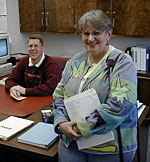By Tom Robertson
Minnesota Public Radio
June 3, 2002
The school fiscal crisis is compounded in many places by declining enrollment, especially in rural Minnesota. The Bemidji School District has fired about 80 teachers, closed two schools and slashed programs to balance its budget in the last two years. Officials there say the financial turmoil has confused local taxpayers and eroded public trust.
| |
|
|
|
||
It's been an emotional time for students and staff at Bemidji's Paul Bunyan Kindergarten Center. This will be the last group of kids to attend the school before it shuts its doors. The closure is part of the district's effort to slash more than $4 million from its $40 million budget.
"The last few weeks it's more of a feeling of sadness," says Tom Kusler, the principal of the school. "I think we have a lot of fond memories of this building. We've been open 17 years. Some of the staff have been here since it opened up."
Part of the problem is, the Bemidji School District is losing students. The district serves about 5,200 students, down about 450 from five years ago. And because state funding is based in part on a per-pupil formula, school officials say it amounts to an accumulated loss of around $6.5 million.
Superintendent Rollie Morud says because the loss of students is spread over all grades, the district has no simple way of cutting expenses.
"A classroom of 20 kids and a classroom of 30 kids costs the same amount of money. It's one teacher, the heat and the lights; a little bit of variance in materials, but not a lot. The cost is really the same for that classroom. So the expenditure side is equal between the two scenarios, but on the revenue side, 10 kids is $60,000 less revenue," says Morud.
Morud and other school officials point to another cause for their budget woes - skyrocketing costs. Heat and electricity costs rose 13 percent statewide last year. Gas prices also shot up, raising transportation costs by 5.5 percent. Morud says that's hard on a district with a busing range nearly the size of Rhode Island. Other costs went up as well.
"Our liability insurance in this district went up $115,000 last year alone. One item. How does that figure into the plan? We're caught on the expense side and controlled on the revenue side," according to Morud.
Bemidji was among a record 181 Minnesota school districts that asked local taxpayers to support a referendum for more money last year. Two-thirds of the referendums passed, but in Bemidji's case, voters said no. That was a big disappointment for school board chair Mary Auger.
"I think there's sometimes a perception out there that school districts just want more money, to spend more and more money, when I think we've made a lot of changes to try to stay within our budget," Auger says.
|
"We're caught on the expense side and controlled on the revenue side."
- Bemidji School Superintendent Rollie Morud |
Auger blames some lawmakers - and especially the Ventura administration - for creating a climate of distrust. Ventura, in fact, has called K-12 education an insatiable "black hole" that swallows up state funding.
"There has never been a cut to public education in this state. Let's finally make that very clear. No one has ever cut public education. They get 40 percent, K-12 gets 40 percent of the state budget right now. When they say that they have to cut, it's only because they didn't receive the amount they wanted," Ventura says.
Bemidji school officials say they accept part of the blame for the referendum's failure. They told voters the money would support "quality education" but did not include a specific plan for the revenue.
District Business Manager Chris Leinen says it was a difficult issue for the district to explain to voters. He says it resulted in lots of rumors and misinformation.
"The state formula for education in Minnesota is so complex, so convoluted, so twisted, so variable, so based on projection and supposition, that to get concrete, understandable answers is very difficult, even for people who work with it on a daily basis," Leinen says.
Leinen says the state's funding formula, combined with the district's declining enrollment, has confused parents and taxpayers, and contributed to an erosion of trust.
"That variable nature of your enrollment translates into huge swings in overall revenue. And when you have those huge swings, people start saying 'well, what's going on?' They don't trust the numbers because the numbers are so changing in nature," according to Leinen.
| |
|
|
|
||
Bemidji's state representative, Doug Fuller, says he voted against the referendum, and suggests the district needs to figure out why it's losing students. The declining numbers are due, in part, to a declining birthrate. But Fuller says there are more kids being home schooled, more attending charter or private schools, or more opting to attend school in another district.
"You would be amazed at how many of those parents come to me and they say 'I will not send my kids to the Bemidji School District.' We have to address those issues and concerns of the parents to get them to want to send their kids. I mean, we have some of the best teachers, but what are we doing that's alienating those parents?" Fuller asks.
Last year, the state Legislature decided to take over the piece of the school funding pie that had come from local property taxes. That worries some administrators, who fear education funding is now subject to political wims and economic uncertainties beyond local control. And Bemidji Superintendent Rollie Morud says asking schools to go directly to voters for so-called "excess levies" is unfair, especially to rural districts like Bemidji, which are more likely to be property and income poor.
"The disparity between the haves and the have-nots is becoming greater and greater in this state. There's a sense of fairness that has to be looked at, and every once in awhile you need to have a correction. And I think we're about ready for that," says Morud.
By far the largest expense for school districts is employee salaries and benefits. It's about 80 percent of a school's budget. One suggestion by some administrators is for the state to establish a statewide salary schedule for teachers and staff, and turn bargaining negotiations over to the state.
Another suggestion popular among rural districts is to modify the per-pupil funding formula to include basic per-classroom funding. Administrators say that would ease the pain districts are feeling from declining enrollment.
Rep. Doug Fuller says it's obvious changes are needed. He doubts they'll come any time soon. "I don't know if we're ready to overhaul the system yet, because that's going to take an incredible groundswell of support to do that. It's not a simple solution."
Observers say the current funding climate will mean Minnesota school districts will continue to seek referendums to ease their budget problems. Bemidji school officials say they may try again as early as this fall.


